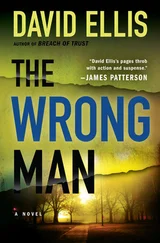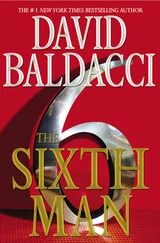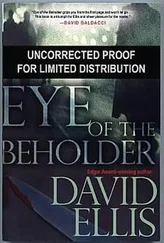“I’m sorry?”
“Or what, Father? What’s He going to take from me, He hasn’t already taken?”
Father Ben deflated. His eyes searched me for something, I wasn’t sure what. I tapped my watch. “I gotta do this,” I said. “Thanks again for your help.”
I took the stairs down to the meeting room. Jim Stewart, it turned out, didn’t look anything like his namesake, the actor. This guy was short and stout and dour, a military crew cut, a guy who seemed like he didn’t have a lot of friends. In his line of work, he probably didn’t.
I thought of one of the actor’s best roles, Mr. Smith Goes to Washington . I thought I might like a sequel. Maybe Smith Goes to Prison.
Or Smith Goes to the Morgue.
“I’ve got a problem,” I told Jim Stewart. “I need your help.”
THE ITALIAN DELI and coffee shop about two blocks from the criminal courts has been a fixture since long before I was a prosecutor. The proprietors, two Sicilian immigrants now in their sixties, are there every day chatting up the customers and telling stories about how things used to be in the city, before the federal government starting sticking its nose into the cesspool of local government, pinching aldermen, exposing bogus city contracts, generally bringing sunlight into areas of public works where shade used to predominate.
It’s mostly a hangout for the lawyers who populate the criminal courts, though cops like to hit the place as well-the exorbitant price of the coffee and pastries notwithstanding. Detective Denny DePrizio was at the counter, as expected, at ten-thirty sharp this fine Friday morning.
We made eye contact as I walked in with the briefcase Smith had given me, still filled with the ten thousand dollars. I’d been followed, as always, by Smith’s men but they kept their usual distance. I doubted they’d check on me unless there was a particular reason to do so, and I wasn’t planning on sticking around for long.
In any event, if I was right, Smith and DePrizio were working together on this, and Smith already knew about this meeting.
DePrizio was at the counter, enjoying some coffee with his jacket thrown over the seat next to him. I moved next to him but didn’t acknowledge him. I set the briefcase on the footstep of the counter next to his feet and leaned in, ordering a large coffee, black, to go.
“That’s the briefcase?” he asked.
I nodded. “The only thing I have that Smith touched. You think there’ll be any prints on it?”
“Hard to say,” DePrizio answered. “Not likely but we’ll know in a few days.”
That was the time frame I figured. There is typically a pretty long line for fingerprint runs.
“Thanks for keeping this discreet,” I said. “I don’t know if I’m being followed, but you never know. Okay if I call you in a couple of days?”
“Sure, Kolarich.” He didn’t hide his opinion of my paranoia. It had been my idea, the surreptitious drop-off, but he’d been a sport about it.
I took my coffee, stuffed a dollar into the coffee cup for tips, and walked away, the briefcase of money at DePrizio’s feet. I didn’t take a deep breath until I was back in my car.
MARIE BUZZED ME in my office at about eleven. “Mr. Smith calling.”
I felt a stirring in my chest, as I did every time I heard from him. We hadn’t spoken for a while now, but he’d sent me a few messages in the interim-a friendly conversation with gang-banger inmate Arrelius Jackson, plus his henchmen mugging Pete in an alley outside a bar.
“Just wanted to check in on you, Jason. How are things? How’s your brother?”
I forced a smile on my face and counted to ten.
“Have you been keeping up your end of the deal?” he went on.
“Memory serves, Smith, I said we didn’t have a deal.”
“Well, I’ve kept up my end. I have a suspect for you.”
“The black-guy-fleeing-the-scene?”
“The very one. You’ll need to see if your witness-his name escapes me-”
“Tommy Butcher,” I said.
“Right, Butcher. You’ll need to see if Butcher might be able to identify our suspect as possibly the man he saw fleeing the apartment building that night.”
“But he wasn’t the man he saw that night.”
“Well, now, Jason, I’m sure you can be persuasive. This was a man he saw at a quick glance, and cross-racial identification is notoriously suspect.”
“You mean, to a white guy, all black guys look alike? That’s not very politically correct of you, Smith.”
But then again, Tommy Butcher wasn’t exactly politically correct, either. Butcher had been sympathetic to my plight, and if I told him that I had a legitimate suspect, he might be willing to “recall” that the person I pointed out to him was, in fact, the guy he saw.
This conversation I was having violated the letter and spirit of pretty much every ethics provision of the lawyer’s code. But at the moment, I didn’t have much of a choice, and the truth was, if this could help Sammy, I’d be willing to consider it, regardless of the source.
“Is this suspect-what’s his name?”
“Ken Sanders.”
“Okay, this guy Sanders-is he going to be cooperative? How’s this going to work?”
Smith said, “He’s obviously not going to admit to anything. But he won’t be able to deny that he was in that building. Mr. Sanders has friends in the building he was visiting that night.”
The building where Griffin Perlini lived, and died, was a subsidized-housing facility that contained, among others, many recently released cons looking to get back on their feet. It made me think that Ken Sanders might have been visiting some such gentlemen, which further made me suspect that Sanders, himself, had a sheet.
“That is correct,” Smith confirmed. “In a nutshell, drugs and violence, but no murder. A full background was stuffed into your mailbox at your house in the past hour.”
He enjoyed letting me know that he knew where I lived. It was a convenient way for him to deliver me something without showing himself or his men.
“Is this guy affiliated?” I asked.
“Is he-what?”
“In a gang, Smith. Is Ken Sanders in a gang?”
“No.”
So Smith actually found a guy willing to be fingered by the defense as a suspect in a murder? He must have put a lot of money into Ken Sanders’s hands.
Smith told me how to get in touch with the aforementioned Mr. Sanders but told me there was another reason for the call. I told him I was all ears.
“I see on the docket entry for the Cutler matter that there is a contested motion for next Tuesday? A defense motion?”
The county courts have recently discovered that we are in a new century, and lots of people use something called the Internet. If you have the docket number of a case, you can access the history of the case, with a data entry for every document filed since the case began. When one of the attorneys files a motion, the docket entry will identify the movant-the defense or the prosecution-as well as designating it “contested” or “agreed.” So Smith could see online that the defense filed a contested motion, but he wouldn’t know the content of that motion or its subject matter.
“I’m moving for expedited DNA testing of the bodies discovered behind that school,” I explained. “Or, in the alternative, a continuance of the trial until DNA testing can be completed.”
Smith was silent. I wondered, for a moment, if his phone had cut out.
“I can only assume you’re joking.”
“You can if you want, Smith. But I wouldn’t.”
“No way, Jason. That’s completely unacceptable. Wasn’t I clear about the terms of our agreement? There will be no-”
Читать дальше












